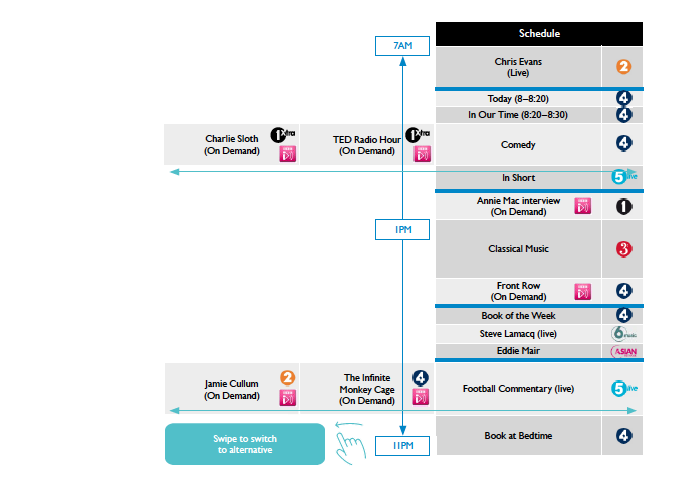The BBC’s latest policy document, published as part of the British national broadcaster’s charter review, foreshadows a strategy for radio that will give the audience more control of what they hear, in an effort to get radio back into people’s pockets via smart mobile devices.
Personalised radio, delivered digitally, whether via broadcast or online, is at the heart of the corporation’s ten year strategy for its radio outlets, published in part two of the report, titled British Bold Creative.
BBC Director General Tony Hall says in the introduction to the report: “This document heralds a more open BBC [that will] thrive in the internet age. Our proposals will lead to a more creative, more distinctive, more personalised BBC.”
Section 7 outlines the BBC’s plans for radio in a chapter titled The Next Radio Revolution:
People still want the simplicity and companionship of live radio but they also increasingly want the experience to be more personalised and more in their control, whether at home, on the move, or in the car. The BBC will meet this need by helping audiences easily create their own, individual radio channels, based on their needs, wherever they are, whatever time of day. Listeners will be able to combine live and on-demand BBC radio content with music playlists and regular updates for news, sport, travel, weather and other alerts.
We will also make personalised recommendations based on listeners’ habits and choices.
This means listeners will get access to all their favourite audio content in one place, but also discover new things that suit their tastes and needs, without having to search through thousands of programmes. It will support varied schedules that mix speech, music and news. It will help people discover the enormous breadth of British creativity and journalism on BBC Radio, allowing them to listen to local and Nations news and radio alongside our national stations and the World Service. All the BBC Radio that you want, in your pocket, at home, or on the move…
Our role as the leading independent curator of music is made possible through our employment of some of the most trusted guides to music in the world who are loved and respected by our audiences.
The BBC has supported the UK music industry from its inception, playing a central role in the health and vitality of UK music—the UK is one of only three net exporters of music globally. We are the
single biggest licensee of music in the UK and the largest employer of professional musicians. Through ground-breaking initiatives such as BBC Introducing and Radio 3’s New Generation Artists, we bring new talent to the mainstream.
But we must adapt if we are to remain relevant to audiences, and remain a cornerstone of the wider music industry.
The rapid growth in digital and online access to music is responsible for significant change in the UK music industry and is affecting how audiences use our music services. We must evolve our music offering so that it serves new audience needs and habits and allows us to remain a strong partner and contributor to the UK creative sector.
To that end, we have developed a digital music proposal with the music industry, which builds on BBC Music’s Playlister. It would make the 50,000 tracks the BBC broadcasts every month available to listen online, for a limited period. Audiences would be able to access this music via playlists curated by the BBC, and they would be able to build their own playlists based on the music they hear and love on the BBC.


